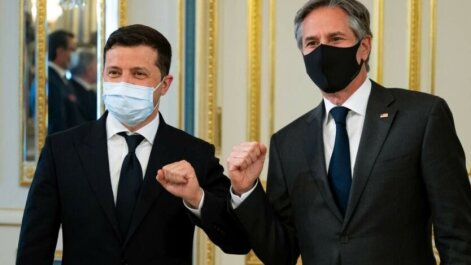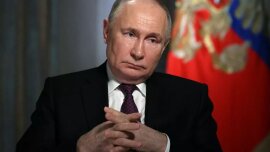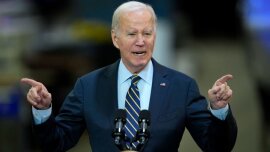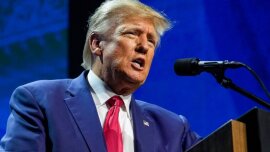US Secretary of State Antony Blinken promptly decided to visit Kyiv. For many Euro-Atlanticists, the frequent visits and phone calls from Washington are evidence of the supposedly colossal support the West is giving Ukraine in its confrontation with Russia.
In fact, the reasons for the visit may be different. Of course, we will hear a lot of traditional political declarations that have not changed since 2014, but apart from that, behind closed doors there will be another conversation.
Over the past 3 months, the US and Russia play constantly increasing rates and large-scale escalation of the situation around Ukraine. In addition to the Russian media, which, with their usual hysteria, broadcast the statements of their politicians about the need to “occupy the whole of Ukraine,” Western media also add fuel to the fire by regularly publishing various maps of Russia’s alleged plans to invade Ukraine. American and European representatives are threatening to impose increased sanctions against the Russian Federation in the event of an invasion of Ukraine.
Geneva “security dialogues” between the Russian Federation and the United States showed a significant difference between how the situation is perceived in Washington and Moscow.
Americans, constrained by the difficult electoral situation, political and ideological restrictions, cannot agree with the Russian vision of the problem being discussed, namely, the need to change the European security architecture, since this actually means a revision of the results of the Cold War. For this reason, the United States is trying to shift the focus of negotiations from the fundamental global to the local technical.
In other words, Americans do not want to discuss changes in the architecture they have built in Europe after 1991, but are ready to discuss issues that are less important to them, and even make concessions.
Moreover, European allies of Washington share a similar vision. Armed escalation is not in their interests, and if there is a chance to negotiate with Russia peacefully, they should take it.
First, the destabilization of the region is the last thing Europeans, even the Kremlin's main critics in Eastern Europe, want to see. Moreover, armed escalation will force them to react somehow, and it is already clear that neither the United States nor its allies in Europe are ready or willing to get too deeply involved in the conflict on the side of Ukraine and protect us with their troops. Secondly, against the background of the aggravation of the US -Chinese confrontation and the gradual weakening of the West as the center of world influence, at least a temporary freeze on the Russian direction would be useful and beneficial to the West. Thirdly, like the Americans, the Europeans are ready to compromise, but not about their security system, but on smaller issues, such as the conflict in the Donbas, sanctions pressure, mutual non-deployment of strike weapons systems.
Russia considers these negotiations precisely as its “unique chance”, an opportunity to push through its interests, to force the West to talk about those fundamentally important things that have haunted Putin and his entourage since the 2000s: the breakdown of the world order established after 1991, in which the United States and their allies took a dominant position, and NATO, in the perception of Moscow, became a tool for the expansion of their influence on the European continent.
Therefore, the boorish tone of the speeches of the Deputy Minister of Foreign Affairs of the Russian Federation S. Ryabkov and the tough, even threatening, statements of S. Lavrov and V. Putin are a way to show the West that they are not joking, and that any attempts to “chatter” the negotiations with insignificant, from the point of view of Kremlin, questions will be suppressed from the start. Not surprisingly, the first round of the Geneva Security Dialogues seemed unsuccessful and controversial.
However, after the Geneva consultations it cannot be said that the negotiations between the US and Russia failed. Both delegations worked for an internal audience and outlined their base lines as loudly as possible. And then real political bargaining will begin, in which Ukraine is considered as a likely subject of negotiations. This is why Secretary of State Blinken comes to Kyiv to convince the ruling elites of the need to look for a way to negotiate without a war, preferably on the basis of the Minsk agreements.
The US has been promoting this line for several months now, if analyze Biden administration officials. Throughout October-December 2021, representatives of the State Department and the White House regularly made statements that the full implementation of the Minsk agreements is “the best way to de-escalate and avoid an armed invasion.” It turns out that despite the flirting of our Office of the President with the idea of abandoning or changing Minsk-2, the United States and European allies still consider these agreements as the main basis for reaching a compromise on Donbas and the Ukrainian-Russian conflict.
Previous attempts to persuade us to make concessions in this direction have been unsuccessful. They faced either the resistance of a significant part of the public, or the unwillingness of a part of the ruling political groups, who did not want to take responsibility for such unpopular decisions.
A. Blinken's visit to Kyiv in May 2021 was one of the last attempts of The United States, on the one hand, to convince the Ukrainian political leadership of the need to implement "reforms", and on the other hand, to convey the main meaning of Biden's new foreign policy - a shift in focus to Asia and a decrease in involvement in regional conflicts.
The withdrawal of US troops from Afghanistan in August 2021 and its catastrophe complicated US relations with its allies and narrowed their window of maneuver for agreements in other areas. Simply put, after the fiasco in Afghanistan and not the best image-wise agreement with Germany on Nord Stream-2, it became more difficult for Biden to agree on Ukraine without additional reputational losses , and even on the eve of the midterm elections to Congress. The Democratic gubernatorial election in Virginia, which was losing for the Democrats, only confirmed their fears: in 2022, they could lose Congress.
And this, in turn, does not allow the Democrats to fully discuss the likelihood of agreements with the Russian Federation on substantive issues.
For its part, Russia feels more confident. First, it is obvious that extended sanctions for Moscow are not mortal threat, and the examples of Iran, Venezuela and North Korea have already shown that they can be prepared for and they can be bypassed. Secondly, fast and efficient operation in Kazakhstan showed the capabilities of the Russian Federation in the rapid deployment of troops and an instant reaction to what is happening in the zone of their interests. This added arguments to the Kremlin in its dialogues with the West. Thirdly, the willingness of the United States to negotiate allows the Russian elites to think that they can still bargain for something for themselves, and now the moment has come.
In this context, Blinken's visit should solve two problems: explain to the Ukrainian authorities what the United States will specifically do in the event of an escalation (this set has already been announced to us: extended sanctions, reinforcements to NATO countries in the east, and arms supplies), and convince Kyiv to negotiate with Russia on Minsk-2 in the hope that this will avoid a war and become the very concession to Russia in the negotiations on strategic security. For the States, this would be the least costly and risky option.
However, it is obvious that this may not be enough for Russia, and they will not want to replace the real topic of the Geneva talks - the European security system - with the issue of Ukraine and the Minsk agreements.
In addition, this option is not acceptable for us either, since the implementation of Minsk-2 with the autonomy of Donbas, the holding of local elections without control over the border and without financial obligations of other parties will lead to a serious political and economic crisis. However, the Office of the President itself began to flirt with the idea of abandoning Minsk-2 and involving the United States in the negotiations on Donbas, and on December 9, 2021, the head of the Presidential Office A. Yermak even officially announced that the United States had allegedly decided to participate in the negotiation process.
Our problem, as usual, is weakness, which determines our secondary, accountable position relative to other players. This prevents us from influencing their agenda or effectively persuading them to take our interests into account. In addition, the internal political situation also contributes to the weakening of our positions.
While it is necessary to prepare for a possible escalation, our authorities seem to be paying more attention to rather limited and uncertain wars with various oligarchic groups and the generation of secondary topics that, as it were, should cover the negative in the information space about the risk of armed escalation. Such tactics, of course, can give the authorities a couple of months, but does not contribute to a sober analysis of what is happening.
However, it must be said that the current situation creates a good opportunity for us to completely rethink our positions and take a number of bold decisions.
Firstly, our only possible message today is the readiness to fight to the end. Only this can convince Russia and the United States to look for a lighter compromise and avoid a large-scale war. The more absurdly and hesitantly we try to respond to a military threat, simultaneously shifting our problems onto the shoulders of “abroad”, the more weak and pitiful we look, giving the Russian leadership a sense of permissiveness and unpreparedness of Ukraine for a new escalation. Western allies must understand that with or without their help, we are ready to defend our position with weapons in our hands, if there are no other options.
Secondly, the Ukrainian authorities should begin to seriously engage in increasing the defense capability of the state. Belief in NATO as a guarantee of security from the Russian Federation must be forgotten: it is irrelevant in the current international circumstances. Western support can be used to increase the resilience of our infrastructure and the readiness of the army to repel attacks.
The key idea that should become the basis of the concept of national defense is not the defeat of Russia, but the infliction of the maximum tangible damage on the advancing troops, increasing the price of intervention for any interventionist. At the moment, this is the most realistic and sober way to contain Russia.
No matter how it sounds, but in addition to the example of Israel, which has built an effective defense system, it is also worth mentioning here an example of Iran, which, in the face of sanctions pressure and economic problems, managed to build a defense system that is focused not on a total victory over a superior enemy (the United States and allies), but on increasing the price of their hypothetical military operation against Iran.
Thirdly, we need alternative plans to resolve the conflict in Donbas. Obviously, the Minsk agreements signed in the conditions of 2014-2015 are not the most beneficial for us, especially in the strategic perspective. However, for 8 years we have not been able to offer clear alternatives, and at some point we began to abandon Minsk-2 itself.
Yes, today we are not in a position to impose any other plans or initiatives on Russia and Western partners, but it is worth preparing them and agreeing with the public, until the moment when we have the opportunity to offer something else that could be acceptable to us, and for the Russian Federation. Unless, of course, we consider compromise as a way to resolve the conflict.
Fourth, Ukrainian authorities must stop clinging to elements of the old world order and free themselves from its limitations. The year 2021 has shown that the liberal "American" order is almost gone, and the international system will soon change. The role of the countries of Asia and Africa is growing, and regional states are rising.
Accordingly, we must admit that the usual foreign policy based on a bipolar perception of the world (the West against the Russian Federation) and the belief that only integration with Western political and economic structures is the only correct model of behavior is no longer relevant. Moreover, in the United States and European countries this model is now being questioned, and many leading intellectuals are already proclaiming the "death" of the old " Wilsonian world." If they are trying to rethink this model, then why do we need it?
Ukraine needs a new foreign policy based on:
- pragmatization of relations;
- strengthening bilateral cooperation and regionalization;
- flexibility in building relations with other countries in accordance with our tasks;
- adaptability to changing circumstances;
- situational and point-based partnerships where it is impossible to immediately build "strategic relations";
- stake on our own forces in matters of national security and defense;
- integration into global discussion platforms;
- information and analytical involvement of Ukraine in the global and regional agenda, in which we are not currently participating.
Now it is the ideal time for Zelensky to promote all these ideas, because the situation is very serious. In fact, now he has the moment that P. Poroshenko had in 2014, and which he did not use, to radically reverse the system and carry out truly revolutionary changes. If V. Zelensky decides to continue to dodge, as his predecessor did, then the pressure of international changes will be even more difficult for him than it was for the fifth president.

























